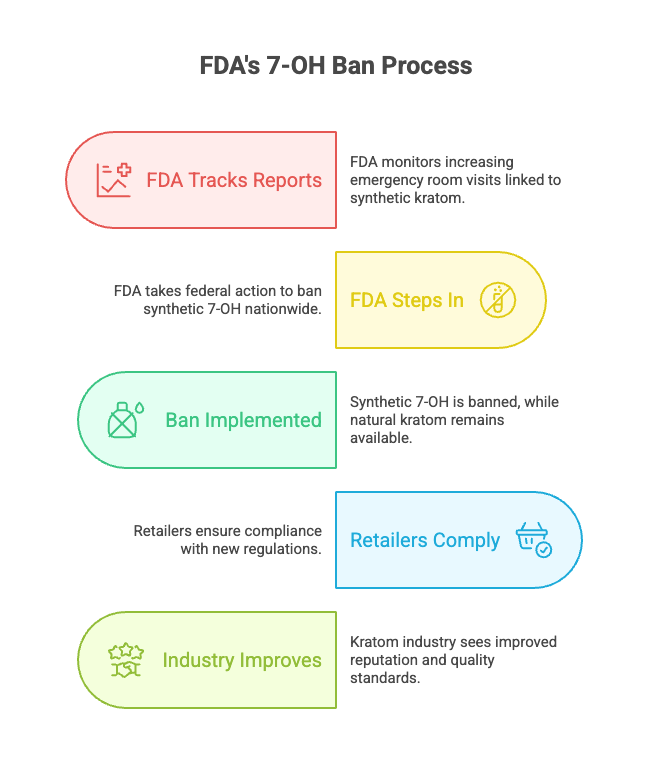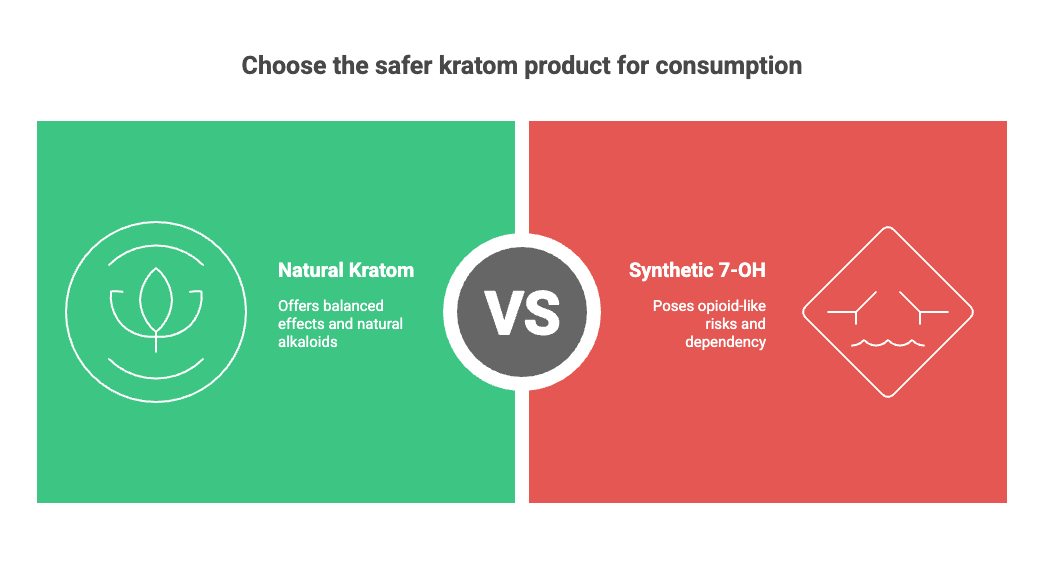FDA Moves to Ban 7-OH: Comprehensive Analysis of USA’s Latest Opioid Crisis Prevention
The FDA recently announced plans to ban 7-hydroxymitragynine (7-OH), a synthetic compound that has sparked serious safety concerns across America. This move represents a critical step in preventing another potential opioid crisis.
Table of Contents
- What Is 7-OH and Why Is It Dangerous?
- Timeline of the FDA's 7-OH Ban Decision
- State-by-State Impact: Florida and Georgia Lead the Way
- How Natural Kratom Differs from Synthetic 7-OH
- Why Flavourz Kratom Supports the 7-OH Ban
- Health Risks Associated with Synthetic 7-OH
- Legal Implications of the 7-OH Ban
- Impact on the Kratom Industry
- What Consumers Should Know Moving Forward
- Key Takeaways
- FAQ Section
Understanding what this ban means for consumers is more important than ever. Many people don't realize the significant differences between natural kratom and synthetic compounds like 7-OH.
What Is 7-OH and Why Is It Dangerous?
7-hydroxymitragynine is a synthetic alkaloid that's much more potent than natural kratom compounds. While traditional kratom contains tiny amounts of this alkaloid naturally, synthetic versions are concentrated to dangerous levels.
The synthetic 7-OH ban comes after mounting evidence of serious health risks. Reports of overdoses, dependency issues, and adverse reactions have flooded emergency rooms nationwide.
Unlike natural kratom products, synthetic 7-OH can be up to 10 times more potent. This extreme potency creates risks similar to prescription opioids, which is exactly what health officials want to prevent.
Timeline of the FDA's 7-OH Ban Decision

The 7-OH ban didn't happen overnight. Federal agencies have been tracking concerning reports for months.
Early 2024 brought increased emergency room visits linked to synthetic kratom products. Many contained concentrated 7-OH levels far beyond what occurs naturally.
By mid-2024, multiple states began considering their own restrictions. The FDA finally stepped in with federal action to create nationwide standards.
The ban specifically targets synthetic 7-hydroxymitragynine while allowing natural kratom products to remain available. This distinction is crucial for consumers who rely on traditional kratom.
State-by-State Impact: Florida and Georgia Lead the Way
Some states moved faster than federal agencies on the 7-OH ban. Florida and Georgia became early adopters of restrictions.
7-OH ban Florida initiatives began in early 2024 when state officials noticed increasing hospitalizations. The state legislature quickly passed emergency measures targeting synthetic compounds.
Similarly, 7-OH ban Georgia efforts gained momentum after several overdose cases. Georgia's approach focused on distinguishing between natural and synthetic products.
These state-level actions helped push federal agencies toward nationwide regulation. Local enforcement has been challenging, but public health officials report positive results.
How Natural Kratom Differs from Synthetic 7-OH

The key difference lies in potency and processing. Natural kratom contains balanced alkaloid profiles that may provide gentler effects.
Synthetic 7-OH products concentrate single compounds to extreme levels. This concentration removes the natural balance found in traditional kratom leaves.
Natural kratom products like those from Flavourz Kratom maintain the plant's original alkaloid ratios. Traditional white maeng da kratom capsules contain naturally occurring compounds without synthetic enhancement.
The manufacturing process also differs significantly. Natural kratom involves drying and grinding leaves, while synthetic 7-OH requires chemical extraction and concentration.
Why Flavourz Kratom Supports the 7-OH Ban
Flavourz Kratom has consistently opposed synthetic kratom products and supports the 7-OH ban. Our commitment to natural, traditional kratom means avoiding dangerous synthetic compounds entirely.
We believe the ban protects consumers from potentially harmful products. Synthetic 7-OH gives all kratom products a bad reputation, even though natural varieties may offer different experiences.
Our red maeng da kratom capsules contain only natural plant alkaloids. We refuse to add synthetic compounds or concentrated extracts that might pose health risks.
Quality testing ensures our products meet strict purity standards. Every batch gets tested for synthetic additives, heavy metals, and contaminants.
Health Risks Associated with Synthetic 7-OH
Medical professionals report concerning patterns with synthetic 7-OH use. Emergency room visits often involve respiratory depression, similar to opioid overdoses.
The concentrated nature of synthetic compounds may create dependency risks. Unlike natural kratom's balanced alkaloid profile, synthetic 7-OH acts more like pharmaceutical opioids.
Withdrawal symptoms from synthetic 7-OH can be severe. Users report intense cravings, anxiety, and physical discomfort when stopping use.
Natural kratom users typically experience milder effects and fewer withdrawal issues. The plant's natural balance may provide built-in safety mechanisms that synthetic versions lack.
Legal Implications of the 7-OH Ban
The 7-OH ban creates new legal categories for kratom products. Synthetic versions become federally controlled substances, while natural kratom remains legal in most areas.
Manufacturers must now prove their products contain no synthetic additives. This requirement benefits consumers by ensuring product purity and transparency.
Import regulations also changed with the ban. Customs officials now test kratom shipments for synthetic compounds before allowing entry.
Retailers face new compliance requirements. Selling products containing synthetic 7-OH can result in federal criminal charges.
Impact on the Kratom Industry
The synthetic 7-OH ban might actually help legitimate kratom businesses. Removing dangerous products from the market may improve the industry's overall reputation.
Natural kratom vendors like Flavourz Kratom welcome increased regulation of synthetic products. Clear distinctions between natural and synthetic help consumers make informed choices.
Quality standards may improve industry-wide. Companies that focus on natural kratom tincture products and traditional processing methods gain competitive advantages.
Consumer trust might increase as dangerous synthetic products disappear from stores. Education about the differences between natural and synthetic kratom becomes more important than ever.
What Consumers Should Know Moving Forward
Always check product labels for synthetic additives. Legitimate vendors will clearly state that their products contain only natural kratom alkaloids.
Ask retailers about their testing procedures. Reputable companies test every batch for synthetic compounds and provide certificates of analysis.
Research your kratom source carefully. Companies with long histories of selling natural products are typically safer choices than newcomers pushing synthetic alternatives.
Understand the difference between natural and synthetic kratom effects. Natural products typically provide gentler, more balanced experiences compared to concentrated synthetic compounds.
Key Takeaways
- The FDA's 7-OH ban targets dangerous synthetic compounds while preserving access to natural kratom
- Synthetic 7-hydroxymitragynine poses opioid-like risks including overdose and severe dependency
- States like Florida and Georgia led early efforts to restrict synthetic kratom products
- Natural kratom maintains balanced alkaloid profiles that may offer gentler effects than synthetic alternatives
- Flavourz Kratom supports the ban and has always avoided synthetic compounds in favor of traditional, natural products
- The ban creates clearer legal distinctions between safe, natural kratom and potentially dangerous synthetic versions
- Consumers should verify that their kratom products contain no synthetic additives through proper testing and certification
FAQ Section
Q: Will the 7-OH ban affect all kratom products? A: No, the ban specifically targets synthetic 7-hydroxymitragynine. Natural kratom products that contain only naturally occurring alkaloids remain legal and available.
Q: How can I tell if my kratom contains synthetic 7-OH? A: Check for lab testing certificates from your vendor. Reputable companies like Flavourz Kratom test every batch for synthetic additives and provide detailed analysis reports.
Q: Are natural kratom products safer than synthetic alternatives? A: Natural kratom may offer more balanced effects due to its complete alkaloid profile. Synthetic 7-OH concentrates single compounds to potentially dangerous levels.
Q: What happens if I'm caught with synthetic 7-OH products? A: Synthetic 7-OH is now federally controlled, so possession could result in criminal charges. Natural kratom remains legal in most jurisdictions.
Q: Will this ban lead to complete kratom prohibition? A: The ban specifically distinguishes between dangerous synthetic compounds and natural kratom. This targeted approach may actually help preserve access to traditional kratom products.
Q: How does this affect kratom research? A: The ban may encourage more research into natural kratom's potential benefits while reducing focus on dangerous synthetic alternatives.
Advice & articles
-
FDA Moves to Ban 7-OH: Comprehensive Analysis of USA’s Latest Opioid Crisis Prevention
7th Aug 2025The FDA recently announced plans to ban 7-hydroxymitragynine (7-OH), a synthetic compound that has
-
Kratom in Colorado 2025: Legal Status & New State Regulations
7th Aug 2025Colorado kratom users have good news to celebrate in 2025. The Centennial State continues to mainta
-
Kratom Tennessee Laws 2025: Legal Status & New Regulations
7th Aug 2025Tennessee residents who use kratom have been watching state laws closely. The kratom regulation Ten
- Read more articles





